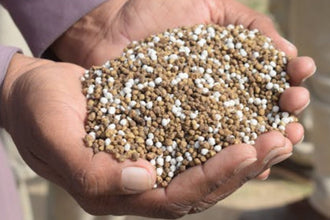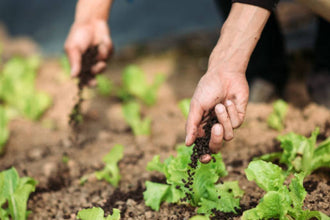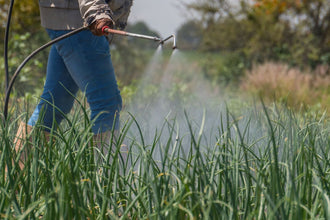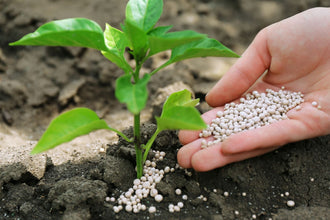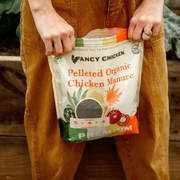
Pelletized chicken manure beats other organic fertilizers hands down when you want great results without dealing with a huge mess. Sure, compost and liquid fertilizers have their fans, but pelletized chicken manure just makes more sense for most gardeners. You get all the good stuff without the headaches.
The whole pelletizing thing basically turns regular chicken poop into these neat little pellets that don't smell terrible and actually work better than the raw stuff. You can store them anywhere, they're super easy to measure out, and you don't have to worry about burning your plants or dealing with gross odors.
What Makes Pelletized Chicken Manure So Much Better
Here's what's cool about pelletized chicken manure. The process squeezes way more nutrition into each pound compared to other organic options. Raw chicken manure has about 4% nitrogen, but when they make it into pellets, they get rid of all that extra water and pack the good stuff into these stable little nuggets.
Fresh manure can seriously hurt your plants or make you sick from bacteria. Pelletized versions get heated up during processing, which kills off the bad germs but keeps the helpful microbes that make your soil happy. You end up with something safe that won't go bad sitting in your shed and won't bring rats or flies to your garden.
Every pellet is basically the same size, which makes spreading them around your garden super simple. You can toss them by hand, use one of those spreader things, or just drop them right into planting holes. Try doing that with regular compost where some chunks are huge and others are tiny.
How It Stacks Up Against Compost
Look, compost is great for building up your soil, but it's pretty weak when it comes to feeding your plants. Most compost only has 1 or 2% nitrogen, while pelletized chicken manure packs 4 to 6% nitrogen that your plants can actually use right away.
Compost definitely wins for making your soil better over time. But making good compost takes forever. You need the right mix of brown and green stuff, you have to turn it regularly, keep it just wet enough but not too wet, and then wait months or even years. Most people mess this up and end up with a smelly pile that doesn't break down right.
Pelletized chicken manure gives you concentrated plant food immediately. Just spread it on your existing garden beds or mix it into potting soil. The pellets slowly break down over months, feeding your plants while also adding organic matter to improve your soil.
Storage is another big win for pellets. Compost needs space for bins or piles, and you have to keep messing with it so it doesn't turn into a stinky anaerobic mess. A bag of pelletized fertilizer sits quietly in your garage taking up almost no room and stays good pretty much forever.
Why Liquid Fertilizers Don't Measure Up
Liquid organic fertilizers like fish emulsion work fast, but you have to keep applying them all season long. Your plants can only grab nutrients when there's enough moisture in the soil, and heavy rain just washes liquid fertilizers right away.
Pelletized chicken manure keeps releasing nutrients as the pellets slowly break down. One application feeds your plants for weeks or months. This saves you tons of work and keeps your plants fed even when it gets dry and liquid fertilizers stop working.
The convenience factor is huge if you're busy. Liquid fertilizers mean mixing, measuring, and timing everything perfectly so you don't burn leaves. You can spread pellets in any weather and they work themselves into the soil when you water or when it rains.
Your wallet will thank you too. One bag of pelletized chicken manure covers the same area as several bottles of liquid fertilizer and lasts way longer. Since it's concentrated, you're not paying to haul around a bunch of water weight.
Pellets vs. Bone Meal and Blood Meal
Bone meal gives your plants good phosphorus for strong roots and flowers, but it barely works in alkaline soil and attracts dogs and other animals to dig up your garden. Blood meal delivers nitrogen fast but can fry your plants if you use too much, plus it smells absolutely awful.
Pelletized chicken manure gives you balanced nutrition with nitrogen, phosphorus, and potassium in amounts that work well for most plants. That 4-2.5-2 ratio means you don't need to buy and mix a bunch of different fertilizers to get good results.
The processing that makes pellets gets rid of the nasty smell problems you get with blood meal and reduces the animal issues that come with bone meal. Pellets break down cleanly without leaving big bone chunks sitting in your soil for years.
You can apply pelletized chicken manure pretty much whenever you want. Bone meal needs to go into the soil weeks before you plant so it has time to work. Blood meal has to be timed just right or it burns tender plants. Pellets work whether you put them down before planting, at planting time, or later in the season.
Storage and Handling Made Simple
Pelletized chicken manure solves all those annoying storage problems other organic fertilizers create. Raw manure needs space and time for composting. Liquid fertilizers need special storage so they don't freeze or go bad. Most organic materials bring mice or bugs.
Pellets store like any other dry garden product. They won't freeze, rot, or attract pests if you keep them in a sealed container. A 50-pound bag takes up about as much room as a big bag of potting soil but has enough fertilizer for thousands of square feet.
Good pellets don't create dust clouds like powdered organic fertilizers. You won't need a mask or have to worry about wind blowing everything away when you're spreading them. The uniform size means they flow smoothly through spreaders without jamming up.
Moving pellets around is so much easier. You can carry a bag from your car to the garden without spills or leaks. They don't get compressed or change texture during transport like other organic materials do.
How to Use Pelletized Chicken Manure
The versatility of pelletized chicken manure beats most other organic fertilizers. You can broadcast them over big areas, work them into individual planting holes, mix them into potting soil, or sprinkle them around established plants.
Different plants like different application methods. Vegetables do great when you work pellets into beds before seeding or transplanting. Perennial flowers and shrubs benefit from annual top-dressing around their roots. Lawn areas can get broadcast applications that break down slowly through watering.
The slow-release action prevents those crazy growth spurts you get with liquid fertilizers. Plants get steady nutrition as pellets break down, supporting consistent growth without making them more vulnerable to bugs and diseases.
Better for the Environment
Pelletized chicken manure creates less environmental mess than many alternatives. Processing reduces volume and weight, cutting down on trucking emissions compared to raw manure or compost. Since it's concentrated, you make fewer trips to the garden center and create less packaging waste.
Nutrient runoff drops way down with slow-release pelletized fertilizers. Unlike liquid fertilizers that wash away in the first rain, pellets release nutrients gradually as plants can actually use them. This keeps groundwater cleaner and supports better gardening practices.
The heat treatment during pelletizing kills pathogens that could mess up water sources if you used raw manure directly. This makes pelletized forms safer for gardens near wells or streams.
Fancy Chicken: Premium Pelletized Organic Fertilizer That Delivers
Fancy Chicken organic pelletized fertilizer stands out as the perfect example of why pelletized chicken manure beats other organic options. This premium fertilizer combines convenience with powerful plant nutrition in their signature 4-2.5-2 NPK formula.
What Makes Fancy Chicken Different
The folks at Fancy Chicken take their pelletizing process seriously. They source their chicken manure from sustainably raised chickens and put it through careful processing that concentrates nutrients while maintaining beneficial microbial activity. Each pellet delivers consistent nutrition without the mess, smell, or storage problems of raw manure.
Their balanced NPK ratio works perfectly for vegetables, flowers, lawns, and houseplants. You get nitrogen for green growth, phosphorus for strong roots and blooms, and potassium for overall plant health. The slow-release formula feeds plants steadily for 4 to 6 weeks per application.
Key Benefits of Fancy Chicken Fertilizer
Fancy Chicken pellets offer several advantages over other organic fertilizers:
-
Microbial boost - Stimulates beneficial soil bacteria and fungi that help plants absorb nutrients better
-
Disease resistance - Strengthens plant immunity against common pests and diseases naturally
-
Root development - Promotes deeper, stronger root systems that handle drought and stress better
-
Soil building - Improves soil structure and water retention over time
-
Safe application - Heat-treated pellets eliminate pathogens while preserving helpful microorganisms
Simple Application Methods
Using Fancy Chicken fertilizer couldn't be easier. For new garden beds, work 2-3 pounds per 100 square feet into the soil before planting. Established plants benefit from light top-dressing around their base every 4-6 weeks during growing season.
The pellets break down gradually with watering, releasing nutrients as plants need them. This prevents nutrient burn and reduces the risk of runoff that pollutes groundwater. You can apply Fancy Chicken in any weather since the pellets won't wash away before they start working.
Long-Term Soil Transformation
What really sets Fancy Chicken apart is their commitment to soil health. While other fertilizers just feed plants, Fancy Chicken builds better soil year after year. The organic matter improves soil texture, increases water retention, and creates the perfect environment for beneficial microorganisms.
Users report seeing greener leaves and stronger stems within 2-4 weeks of application. But the real magic happens over time as soil fertility improves and plants become more resilient. Gardens treated with Fancy Chicken show increased crop yields and better disease resistance season after season.
The company backs their product with confidence because they've seen the results in their own trials. When combined with good gardening practices, Fancy Chicken transforms tired soil into thriving garden beds that produce better harvests year after year.
Give Your Garden the Fancy Chicken Advantage
Your plants deserve better than synthetic chemicals or complicated organic fertilizers that create more work than results. Fancy Chicken pelletized organic fertilizer delivers the convenience you want with the proven nutrition your garden needs.
Stop dealing with messy composts, smelly liquid fertilizers, or multiple products that don't work together. Fancy Chicken's all-natural 4-2.5-2 formula builds healthier soil while feeding your plants exactly what they need for stronger growth and bigger yields. Your garden will thank you with vibrant colors, robust growth, and harvests that make all your neighbors jealous.
Getting Started with Pelletized Chicken Manure
Most garden plants do well with 2 to 4 pounds of pelletized chicken manure per 100 square feet applied once or twice during the growing season. Vegetables and annual flowers benefit from spring application before planting, with maybe another boost mid-season if they need it.
Established perennials don't need as much feeding. Apply pellets in early spring when growth starts, working them lightly into the soil around plants. Trees and shrubs benefit from annual applications spread under the whole canopy area.
Container gardens respond really well to pellets mixed into potting soil at planting time. Use about 2 tablespoons per gallon of soil mix for most plants. The slow-release nature provides nutrition all season without the salt buildup you get with synthetic fertilizers.
Time your applications with your watering schedule to help pellets break down well. Spring applications work great because increasing soil moisture and temperature get the breakdown process going just as plants start their most active growth period.
Pelletized chicken manure just makes sense for gardeners who want organic nutrition without all the complications of other organic fertilizers. Your plants get consistent feeding, your soil builds long-term health, and you save time and effort throughout the growing season. Why make gardening harder than it needs to be?




